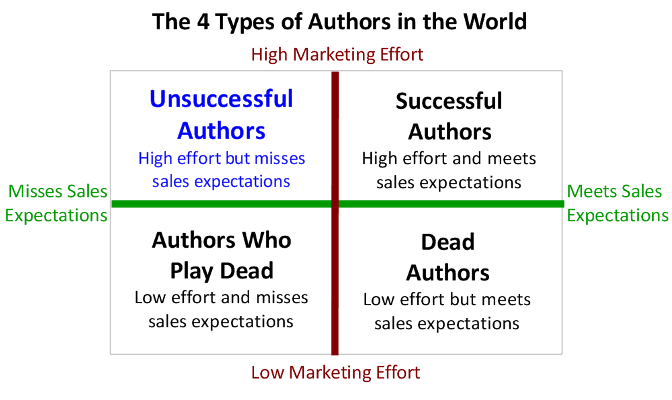My previous post explained how there are only four types of authors in the world, and we discussed why successful authors are rare and what makes them tick. In this post, let’s flip the focus to those who don’t sell many books, the causes of their frustration, and some solutions that can be applied.
Unsuccessful authors are characterized by high effort that doesn’t produce results and falls short of sales expectations. They work hard, but not smart. For example, they may try all sorts of marketing activities, but they don’t execute them effectively. So, their attempts to build a larger following of readers fizzles out. A typical refrain is, “I tried marketing, but it didn’t work.”
Marketing isn’t the problem. Unsuccessful authors tend to get in their own way by making decisions that work against themselves. In my experience coaching over 400 authors, I see these 10 common mistakes:
- Choosing to be bland and wondering why people don’t notice their books.
- Disappearing from marketing for six months to write a new book and wondering why their audience disappeared.
- Neglecting to help promote other people’s books and wondering why no one will help promote their books.
- Never offering free resources or sample content and wondering why people won’t pay for their book.
- Sending a newsletter only twice a year and wondering why no one responds.
- Writing for years without building a promotional database of email addresses over time and wondering why they have too few readers.
- Failing to prepare for a media interview and wondering why people didn’t buy their book after the interview.
- Never changing the content on their website and wondering why readers never return.
- Spending too much time writing on Facebook because it’s free and wondering why they can’t make enough money to support their writing.
- Blaming a lack of sales on the publisher and wondering why the publisher won’t return emails or phone calls.
It’s hard to succeed when an author makes these kinds of mistakes. The good news is that unsuccessful authors can change. If they exhibit high effort and good writing ability, many times their energy can pointed in the right direction for better results. It’s easier to turn a fast-moving boat, than a slow-moving ship. Likewise, a lot of unsuccessful authors can become successful when given the proper training on effective marketing techniques, are held accountable for their activity, and provided role models to follow.
Publishers are in a prime position to offer effective training. But, I don’t see many taking advantage of the opportunity. It’s not enough to email an author a lame, 20-page, PDF file called “How to Market a Book” and expect them to get results. That’s like a mechanic throwing you the owner’s manual to your car and telling you to fix it yourself. Publisher should invest to help grow their content creators. Assemble an online knowledge base, share best practices, record interviews with successful authors, and give authors the incentive to improve. Play to an author’s desire to touch as many people as possible with their books.
When I meet an unsuccessful author who wants to transform from a caterpillar into a butterfly, I tell them to get into the cocoon and concentrate on these 10 steps:
- Rewrite all of your marketing language to focus on answering the reader’s ultimate buying question, “What’s in it for me?”
- Develop your voice and be contrarian. Don’t try to make everyone like what you write.
- Build a distinct brand that’s memorable and make yourself stand out from the crowd.
- Write from your passion, rather than follow the latest trends or listen to other people.
- Err on the side of over-communicating with your readers; it’s worse to under-communicate.
- Invest in creating a professional website and pick a few marketing activities that legitimately generate book sales and do them religiously. As your confidence grows, add new activities.
- If you attempt a new marketing tactic that doesn’t work, shut it down and try something else. But, don’t completely shut down and do nothing at all.
- Never get on a stage or in front of a microphone and attempt to “wing it.” Always practice out loud before a media interview or speech. Record yourself and listen to it.
- Focus on building alliances with successful authors and large organizations by helping to promote their material first. If they return the favor, you can get access to a huge audience.
- There is no money in books, but there is a lot of money in what books can create via spin-off products, public speaking, consulting gigs, movie rights, etc. Always think outside the book.
Statistically, unsuccessful authors make up the largest percentage of writers at most publishing houses. If this wasn’t the case, publishers would have much higher sales and more leverage over Amazon. Therefore, helping unsuccessful authors improve their marketing abilities by a modest amount can pay large dividends. Nobody loves a story better than a success story.
In my next post, we’ll examine the Dead Author category and discover what the living can learn from the departed.
If you fall into the Unsuccessful Author category, get expert help from Rob Eagar to grow your platform and boost book sales.

This is excellent advice–I esp. loved the err on the side of over-communication vs under-communicating. Will be catching up on the whole series and tweeting!!!
Thanks Rob for such a helpful post! Of course, as authors, we want to be in the successful and alive category! Thanks for your wisdom to help us toward that end!
Excellent!